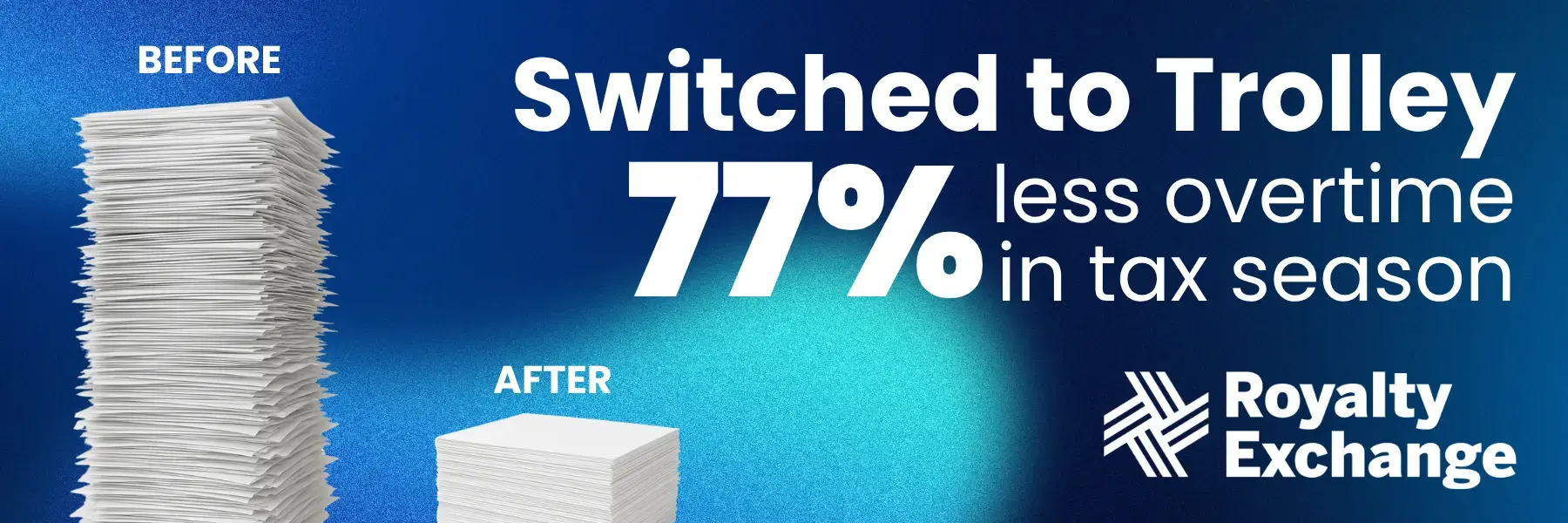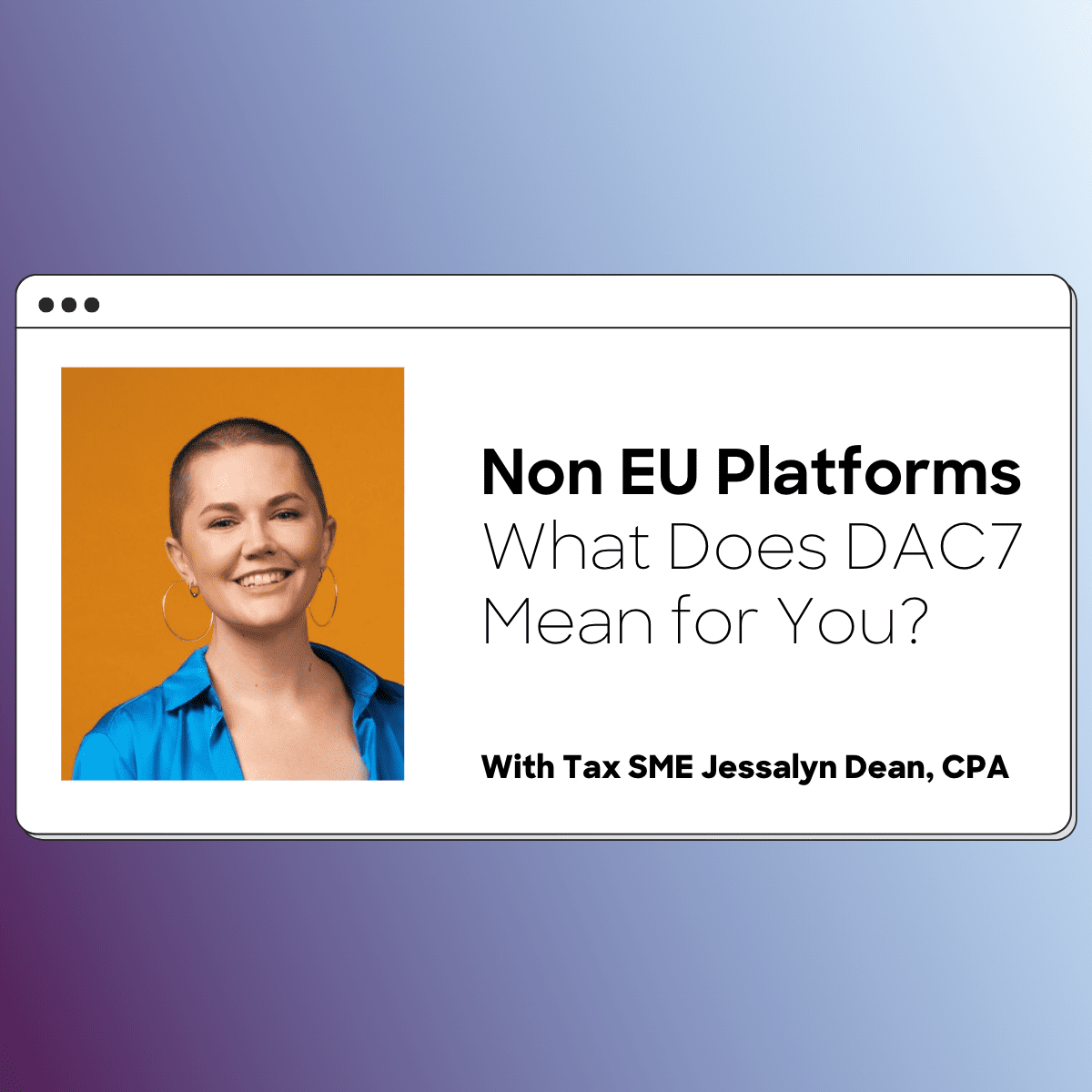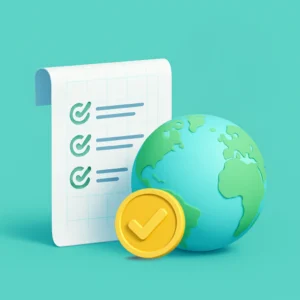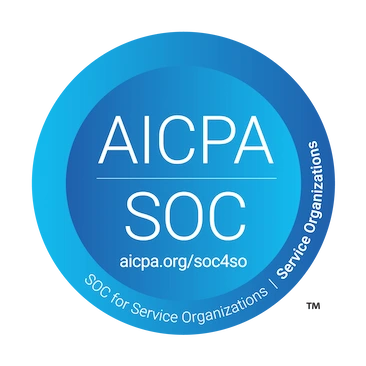In recent years, it’s clear that there has been a paradigm shift regarding how people make money – such as freelancing, selling items online, contract jobs – and thus, how they report income taxes (spoiler alert: a lot of it has gone unreported!).
Global governments are finally catching up to this and are responding to the needs of the platform and gig economies; that is, addressing commercial relationships and exchanges that are built over digital platforms. Authorities have limited insights into the income of these digital goods and service providers – and that’s where DAC7 comes in. If you’re thinking to yourself: “what the heck does this acronym mean?” then here’s a refresher:
DAC7 is the European Union’s seventh revision of their Council Directive (EU) on administrative cooperation in the field of taxation. This directive presents a crucial shift in how digital platforms are treated under European tax law, prompting many companies to question, “Does DAC7 affect my company?”
The implications of DAC7 are not confined to businesses located within the EU. Given the international nature of digital business, DAC7’s reach extends to numerous companies outside the European Union, leading to further confusion about the directive’s impact.
FYI: If you’re not sure if you’re in scope of DAC7, we recently released a guide that walks through the simple tests you need to do to see if you’re in scope of DAC7.

Table of contents
DAC7 & Non-EU Resident Platforms
Today we’re going to be outlining how DAC7 may impact you if your marketplace is based outside of the EU.
Essentially, if you run an online platform where goods and services are sold by sellers with a primary address in an EU member state, or you have sellers that offer real estate located in an EU member state, then you should take the time to understand your tax reporting obligations under DAC7.
How does DAC7 apply to a platform located outside of the EU?
Whether your platform is based within the EU or elsewhere, the location of your sellers and their properties may still bring you within the scope of DAC7. As always, we recommend seeking professional legal/tax advice to fully understand how these rules apply to your specific situation.
Now let’s break down what you need to know about DAC7 depending on your base country.
DAC7 & The UK
To shed light on this complex situation, Trolley’s Tax Product Manager, Myles Foster sought insights from taxation subject matter expert, Jessalyn Dean, CPA.
In this clip, they chat about how DAC7 works in countries outside of the EU, with a specific focus on the United Kingdom (hey, EU neighbor!). Essentially, for those asking if the UK is implementing a similar set of rules to DAC7, the answer is an emphatic yes. In fact, the UK is one of the first countries outside of the EU member states to do so.
What is the UK version of DAC7? When is it effective?
The UK is implementing the OECD recommendations that were used in building DAC7, but their rules have some differences in comparison to DAC7.
The UK is implementing this version into their domestic legislation with a one year delay. That means that the laws are effective as of January 1st, 2024 with the first reporting being done in 2025. Until then, UK platforms working with EU-based sellers will need to register and report in an EU member state of their choosing to remain compliant.
What happens once the UK version is live?
Do you still need to report in an EU member state once the UK version of DAC7 goes into full effect? According to Jessalyn, the answer is “maybe.” And that’s because DAC7 has what is called a “switch off mechanism.”
When the UK rules are enforced and that data is being exchanged by HMRC (the UK tax authorities) over to the EU member states, then the UK platform can stop reporting that same information on sellers and transactions to the EU that they’ve already reported to HMRC.
“At first it’s a timing issue, given the one year delay. But if the UK implements their version of these rules and doesn’t have a comparable set of reporting data, then the platform might still need to report the Delta to an EU member state. So anything that doesn’t get reported by HMRC, the platform might need to still go ahead and report that difference,” says Dean.
What about other countries?
The same conversation could apply to a Canadian platform (or other OECD nation). However, the timing is different because each country will be implementing their version of these OECD rules in the timeframe that they choose to – if they even choose to.
The same also applies to US platforms, but since they have not indicated that they intend to implement their own version of DAC7 anytime soon, they will not have the “switch off mechanism.” That means that US-based platforms will need to register and report in the EU member state of their choice, possibly indefinitely.
Speaking of the US…
DAC7 & the US
We’ve heard the question: “Hey, I’m a US marketplace, and I already report seller earnings on a 1042-S every year. Does this replace the DAC7 reporting requirements? Do I still have to do this DAC7 XML reporting, or can I just send my 1042-S?” Jessalyn answers it below:
The short answer is “yes, you do.” But let’s dig into the “why?”
“1042-S data is not exchanged with other countries – and that’s one of the biggest drivers of DAC7,” says Dean. “DAC7 is about what we call domestic reporting. You know, the Dutch government learning about Dutch sellers, but it’s also the Dutch government learning about Dutch resident sellers, but that might be earning income outside of the Netherlands.”
DAC7 offers a cross-border exchange of data, and if you are a US platform reporting your non-US sellers to the US government, then the US government is not sharing that information with other countries, including both EU member states and non-member states.
Dean adds: “You’re kind of having to report under multiple regimes simply because they don’t work in a cross-border way.”
Where to Report
If you discover that your platform is in scope of DAC7, you will generally need to choose an EU member state to report in. Each country has a different registration deadline, so you will need to verify that before proceeding.
When it comes to choosing where to report, you’ll need to pick a jurisdiction with a portal that’s “foreign-company-friendly” enough for you.
For example, that could mean one that operates in a language you speak, or one in which most of your sellers are located. There are different considerations to weigh here and it’d be best to speak with a tax advisor before locking in your decision and registering with a forign tax authority.
What steps has your business taken to prepare for the upcoming DAC7 obligations?
Navigating the scope of various tax rules can be a complex process for businesses that operate online, but it’s crucial for digital platforms to understand and keep up with their tax obligations.
For online marketplaces based in the EU or paying sellers in the EU, DAC7 should be on your radar. The reporting requirements will be compulsory starting in 2024, which means that companies need to start collecting data ASAP.
Curious about what Trolley can do to help your online marketplace comply with DAC7 regulations when paying EU sellers? Learn more about the new DAC7 compliance product or follow our step-by-step guide to enable DAC7 features in your account.
See Trolley Tax in action: Take the Trolley Tax tour >
If you have any questions about DAC7, feel free to reach out, and we’d be happy to help!
This article is intended for educational and informational purposes only. Through the publication of this article, Trolley is not offering any legal, taxation, or business advice. We strongly encourage each reader to consult with their relevant lawyer, accountant, or business advisors with respect to the content of this post. Trolley assumes no liability for any actions taken based on the content of this or other articles.












